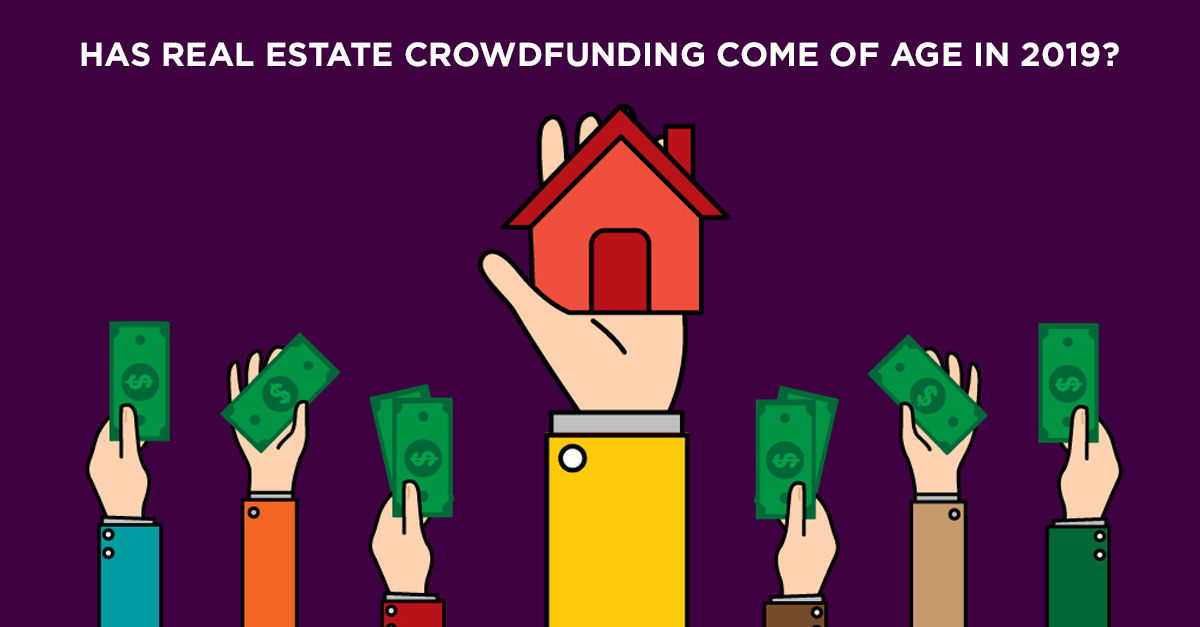Has real estate crowdfunding come of age in 2019?
Former US President Barack Obama called the JOBS act a “game-changing” bill, moments before signing it into law in 2012. The law was intended to encourage financing of SMEs, by moderating long-standing securities regulations and allowing such businesses to acquire funding from non-accredited investors – who, at the time, accounted for 97% of the population. By 2015, over $35 billion had been raised worldwide by web-based crowdfunding, as a testament to the transformative potential of this approach and President Obama’s upbeat words. Crowdfunding has since evolved and permeated across commodities and countries, altering the landscape of fundraising and democratizing investments. Today, by one estimate, the crowdfunding market is projected to grow to $300 billion by 2030(1).
Conventional real estate investment is intrinsically capital-intensive and involves market risks, as well as a dependence on regional socio-economic factors. Real estate crowdfunding has found takers within a very short span since its launch, since it offers wide-ranging investment opportunities, remote access, decentralized trade, transactional transparency and pseudo-anonymity, among other added benefits. This unique opportunity gives investors with varied financial capabilities an incentive to buy into a piece of the real estate pie. In the last eight years, the crowdfunding market has evolved ceaselessly, with the consolidation, shutdowns and buyouts of many companies. Thanks to growing internet penetration, increased involvement of policy makers, widespread awareness and accessibility, the crowdfunding market is now set to embark on its next evolutionary phase.
Coming of age
As crowdfunding is predominantly internet-mediated, the practice contained a vast scope for scaling from the get-go. By 2016, over 100 crowdfunding platforms spread across the globe were soliciting real estate investments for turnkey projects, off-plan properties, re-development of rundown establishments and acquisition of distressed mortgages. As expected, crowdfunding made a much-anticipated entry into the UAE property market in 2018, accompanied by a catchy news headline that read: ‘buy real estate in Dubai for as low as Dh5,000’(2). It was with such an unprecedented offer that a digital investment platform called SmartCrowd, licensed by the Dubai Financial Services Authority and boasting a secure investment structure, announced itself in the Middle East.
However, contrary to the widely-held belief, SmartCrowd is not the first of its kind in Dubai. Ambitious entrepreneur Waleed Esbaitah founded a real estate crowdfunding platform called Durise early in 2014 which, in his own words, catered to over 5,000 users before shutting down operations due to regulatory roadblocks, among other unfavourable market conditions (3). A similar happening can be found in the US market, after RealtyShares—one of the earliest and largest crowdfunding platforms in the world—was shutdown(4). Both the aforementioned companies faced market-specific challenges, or perhaps were way ahead of their time, too early for their own good.
The RealtyShares operation was taken over by RREAF and iintoo, who have since turned the tables and recently raised close to a billion dollar in real estate crowdfunding. In the context of Dubai, SmartCrowd too has undertaken several successful crowdfunding campaigns since its inception. Central to its success is an award-winning business model, reinforced by regulatory security, a meticulous property-vetting process and low entry cost. SmartCrowd is promising 11.73% total annual returns on investments, at the moment. According to an assessment reported by ‘The Motley Fool’, even rates of return between 15–20% are a strong possibility in the current market(5). By and large, based on both successful and unsuccessful precedents, it is safe to infer that real estate crowdfunding has come of age, offering a level playing field to investors and developers alike.
The way forward
As often as not, real estate crowdfunded investments entail a 7 to 10 year lock-in period, which means, deals closed during the earliest wave in 2013-14 will soon mature. Discouraged by limited liquidity options and lack of opportunities in the secondary market during long lock-in periods, some previous investors have expressed the desire to see the introduction of such options. In response, real estate crowdfunding platforms are adopting new strategies and exploring new avenues like tokenization of real estate assets, which offers more liquidity and perks associated with Blockchain technology. Developers are also offering project-specific benefits in a market plagued by supply glut and prolonged stagnation.
The potential of crowdfunding platforms to promote financial inclusion in a sector traditionally tailor-made for wealthy investors is truly commendable. It empowers smaller investors, who constitute the vast majority of population, to make secure investments, and thereby unlocks massive economic potential. The proposition is also advantageous to developers, as crowdfunding reduces investor relations work, increases brand recognition and helps raise capital in a fast, efficient manner. In a dynamic economy like Dubai, which offers best-in-class real estate offerings, robust regulatory framework and rising disposable income, crowdfunding is set up for success, especially with new innovations being added to its intrinsic advantages, as they emerge.
- https://www.fundera.com/resources/crowdfunding-statistics
- https://www.khaleejtimes.com/business/real-estate/buy-real-estate-in-dubai-for-as-low-as-dh5000-1-
- https://durise.com/
- https://www.propmodo.com/the-past-present-and-future-of-real-estate-crowdfunding/
- https://www.nasdaq.com/articles/an-introduction-to-real-estate-crowdfunding-2019-10-14




